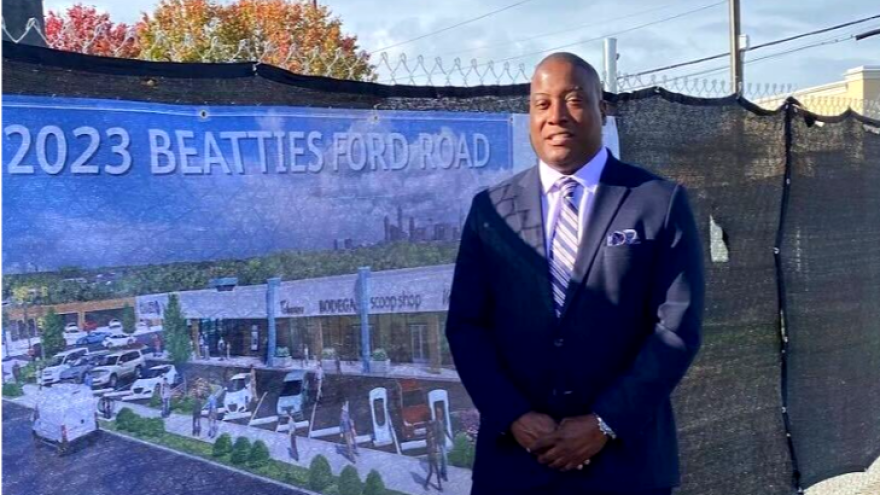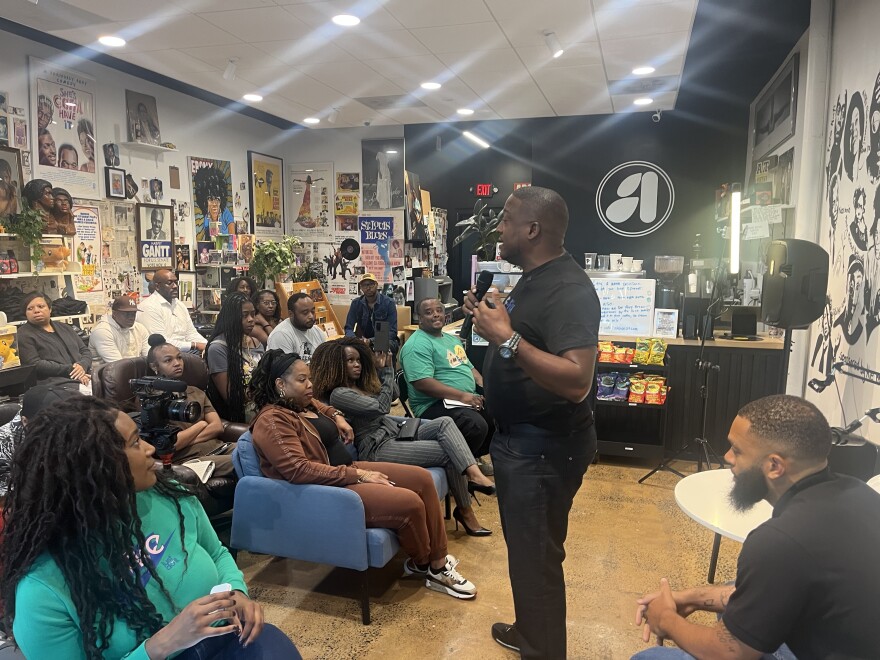Congress has cut federal funding for public media — an $800,000 loss for WFAE. We count on readers like you to protect our nonprofit newsroom. Become a monthly member and sustain local journalism.
The nonprofit Historic West End Partners has been pushing back on the narrative that the Beatties Ford corridor is unsafe. In part one of a two-part series, WFAE explored the group's new initiative that aims to increase foot traffic for small businesses amidst that narrative. In part two, WFAE continues to look at the Historic West End's efforts to revitalize the area, the challenges, and why many businesses continue to love it there.
About five minutes west of uptown, a jazz singer entertained a cafe that had more than a dozen people on a recent evening. Sherry Waters owns the Pauline Tea-Bar Apothecary, which opened in 2019 and draws plenty of customers. The busy lounging area is a stark contrast to Waters' second location, which opened last year on Beatties Ford Road with financial support from The Historic West End.
Waters used to work at Johnson C. Smith University on Beatties Ford Road and served on the local YMCA board. She said she opened the second tea bar because she wanted to change perceptions of the community.
“It’s not fair for one corridor to be pigeonholed to be the crime center of Charlotte,” Waters said.
Beatties Ford Road has a longstanding reputation as a dangerous area. In 2020, a high-profile mass shooting left four people dead and several others injured at a block party. The shooting remains unsolved and occurred during a period when Charlotte saw a 45% increase in firearm-related assaults from 2019 to 2020, according to a report by the UNC Charlotte Urban Institute.

Waters decided to open anyway because the location sits near a busy freeway and the JCSU campus, where she thought students would stop by.
“What I expected didn’t really happen over the course of the year,” Waters said.
In February, Waters closed the second location because she couldn’t cover the new rent. She also said she wasn’t sure if people knew they existed and felt comfortable enough to stop there. Waters spotlighted one incident that happened before the closure.
“Someone took a muffin from one of our customers' plates,” Waters said. "Obviously, he was hungry, and that’s what being impoverished will do, and dealing with mental health, a double whammy."
Walters said she reported that incident to the police and added that the area is no different from any other community. At her first location, she said women who felt they’ve been victims of domestic violence have run to her spot in search of help, as well as others.
“I’ve had a couple of people who are homeless sleep on our porch and use the outlet to charge their phones because he is looking for a job, and this is the only way he can charge his phones,” Waters said. "So, it’s everywhere. One of the outcomes of urban renewal is that you have people who are displaced as well. That can’t keep up.”

A legacy of being pushed out
In the 1960s, the Brooklyn neighborhood in uptown was demolished, pushing many African Americans to places like Beatties Ford Road. The effect of that history is something Waters still sees today in places like Beatties Ford Road, which is just north of uptown and nearby areas characterized by new high-end coffee shops, new and big mansions, and breweries mixed in with older houses.
Amidst those changes, there are people trying to make sure residents on Beatties Ford Road don’t get left behind. At the café Archive CLT, dozens gathered for Christopher Dennis' motivational speech that kicked off the Dennis Real Estate and Roast forum.
Dennis is a developer. He bought two commercial spaces in the area around 2020 for over $2 million. He’s joined other community members who reflect the mostly Black neighborhood and are interested in following his path by attending his Real Estate and Roast forum. The conversation aims to help people learn how to invest in places like Beattie's Ford.
“It was a community where there was crime and some challenges, but this community is a strong community,” Dennis said. "When I bought these buildings, I knew there was a challenge, but perception could be changed.”
Dennis rents some of his space to some small Black-owned businesses, such as Archive CLT. The retail spot is also anchored by two banks, including Chase. Dennis said the financial resources they bring are needed to reshape the low-income community.
“The banks create a lending opportunity. It creates a handshake, versus a handout,” Dennis said. "Giving people an opportunity to come get loans and learn about financing.”

'Dedicated to Black culture'
Amidst trying to revitalize the area, Dennis said he has spent about $75,000 to repair damage to the commercial spaces because of incidents like people throwing rocks at the property. But he says incidents like that shouldn’t define the area.
“You see across a lot of marginalised communities, you get the news or the stories that are always about the crime in the area,” Dennis said. "And never the positive things that are happening. You don’t hear about the Real Estate and Roast, but you’ll hear about a shooting or car theft on Beatties Ford Road.”
At the coffee shop Archive CLT, owner Cheryse Terry poured away to make a customer a chai latte. Terry grew up in the nearby area. She said she opened in Dennis' commercial spot in 2022 to fill a void.
“We need a space where we could come and unwind. A meeting space that was dedicated to Black culture,” Terry said.
The shop is plastered with art on the walls that depicts figures such as Malcom X and Martin Luther King Jr. Vintage magazines and comics dotted around Archive CLT also celebrate Black History. Despite being in an area deemed as not safe, Terry says she draws a wide, diverse range of customers.
“People in this community aren’t the majority of my customers. The majority of my customer base drives here," Terry said. "They aren't from this side of town at all. They drive a long way to come here, and they’re here with their laptops working, in and out of their cars for hours at a time.”
She said people are stopping by from places like the University area, south Charlotte, Harrisburg and Gastonia.

As for her thoughts on removing the area’s narrative, Terry says.
“We need more resources in the area that addresses substance abuse, mental health, like people are on the ground, Terry said. "We need resources on the ground that provide an alternative and solution to clean up the streets. Not necessarily to criminalize the people, but to offer an alternative to hanging out on the streets.”
Terry said that would help debunk the narrative but also draw more people to places like Archive CLT and other small businesses on Beatties Ford, where they can embrace and learn more about one of Charlotte's historic Black neighborhoods.
That’s part two of WFAE’s series that explores the Historic West End's Partners' latest efforts to change a neighborhood narrative around safety, bring more people to Beatties Ford Road, and why small businesses love it there. You can find part one here.




